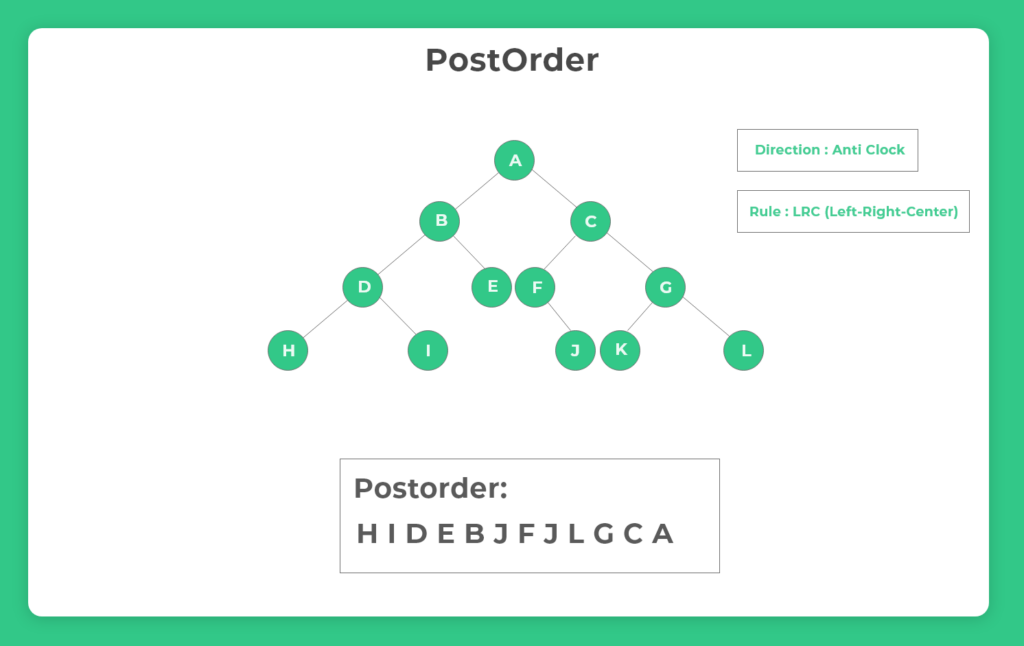Post-order tree traversal in C
Post-order tree traversal without recursion
In postorder traversal , first we traverse the left subtree, then the right subtree and finally the root node. Postorder traversal is also used to get the postfix expression of an expression given.In this post , post-order tree traversal without recursion is discussed using one stacks.

Postorder Tree Traversal without recursion in C
Algorithm :
- Create an empty stack.
- While root is not NULL, push root->right and then root to the stack.
- And Set root as root->left.
- If root becomes NULL, pop item from the stack and set it as root.
- If the popped item has a right child and the right child is at top of stack, then remove the right child from stack, push the root back and set root as root’s right child.
- Else print root’s data and set root as NULL.
- Repeat the above two steps until stack is not empty.

Code based on above algorithm :
Run
#include<stdio.h>
#include<stdlib.h>
#define MAX_SIZE 100
struct Node
{
int data;
struct Node *left, *right;
};
struct Stack
{
int size;
int top;
struct Node **array;
};
struct Node *newNode (int data)
{
struct Node *node = (struct Node *) malloc (sizeof (struct Node));
node->data = data;
node->left = node->right = NULL;
return node;
}
struct Stack *createStack (int size)
{
struct Stack *stack = (struct Stack *) malloc (sizeof (struct Stack));
stack->size = size;
stack->top = -1;
stack->array =
(struct Node **) malloc (stack->size * sizeof (struct Node *));
return stack;
}
int isFull (struct Stack *stack)
{
return stack->top - 1 == stack->size;
}
int isEmpty (struct Stack *stack)
{
return stack->top == -1;
}
void push (struct Stack *stack, struct Node *node)
{
if (isFull (stack))
return;
stack->array[++stack->top] = node;
}
struct Node *pop (struct Stack *stack)
{
if (isEmpty (stack))
return NULL;
return stack->array[stack->top--];
}
struct Node *peek (struct Stack *stack)
{
if (isEmpty (stack))
return NULL;
return stack->array[stack->top];
}
void postorder (struct Node *root)
{
if (root == NULL)
return;
struct Stack *stack = createStack (MAX_SIZE);
do
{
while (root)
{
if (root->right)
push (stack, root->right);
push (stack, root);
root = root->left;
}
root = pop (stack);
if (root->right && peek (stack) == root->right)
{
pop (stack);
push (stack, root);
root = root->right;
}
else
{
printf ("%d ", root->data);
root = NULL;
}
}
while (!isEmpty (stack));
}
int main ()
{
struct Node *root = NULL;
root = newNode (10);
root->left = newNode (20);
root->right = newNode (30);
root->left->left = newNode (40);
root->left->right = newNode (50);
root->right->left = newNode (60);
root->right->right = newNode (70);
printf ("Post order traversal of binary tree is :\n");
printf ("[");
postorder(root);
printf ("]");
return 0;
}
Output :
Post order traversal of binary tree is : [40 50 20 60 70 30 10]
Prime Course Trailer
Related Banners
Get PrepInsta Prime & get Access to all 200+ courses offered by PrepInsta in One Subscription
Get over 200+ course One Subscription
Courses like AI/ML, Cloud Computing, Ethical Hacking, C, C++, Java, Python, DSA (All Languages), Competitive Coding (All Languages), TCS, Infosys, Wipro, Amazon, DBMS, SQL and others
Introduction to Trees
Binary Trees
- Binary Tree in Data Structures (Introduction)
- Tree Traversals: Inorder Postorder Preorder : C | C++ | Java
- Inorder Postorder PreOrder Traversals Examples
- Tree Traversal without Recursion
Binary Search Trees
Traversals
- Traversal in Trees
- Tree Traversals: Breadth-First Search (BFS) : C | C++ | Java
- Tree Traversals: Depth First Search (DFS) : C | C++ | Java
- Construct a Binary Tree from Postorder and Inorder
B – Trees
AVL Trees
- AVL Trees
Complete Programs for Trees
- Depth First Traversals – C | C++ | Java
- Level Order Traversal – C | C++ | Java
- Construct Tree from given Inorder and Preorder traversals – C | C++ | Java
- Construct Tree from given Postorder and Inorder traversals – C | C++ | Java
- Construct Tree from given Postorder and Preorder traversal – C | C++ | Java
- Find size of the Binary tree – C | C++ | Java
- Find the height of binary tree – C | C++ | Java
- Find maximum in binary tree – C | C++ | Java
- Check whether two tree are identical- C| C++| Java
- Spiral Order traversal of Tree- C | C++| Java
- Level Order Traversal Line by Line – C | C++| Java
- Hand shaking lemma and some Impotant Tree Properties.
- Check If binary tree if Foldable or not.- C| C++| Java
- check whether tree is Symmetric – C| C++| Java.
- Check for Children-Sum in Binary Tree- C|C++| Java
- Sum of all nodes in Binary Tree- C | C++ | Java
- Lowest Common Ancestor in Binary Tree- C | C++ | Java
Introduction to Trees
Binary Trees
- Binary Tree in Data Structures (Introduction)
- Tree Traversals: Inorder Postorder Preorder : C | C++ | Java
- Inorder Postorder PreOrder Traversals Examples
- Tree Traversal without Recursion
Binary Search Trees
Traversals
- Traversal in Trees
- Tree Traversals: Breadth-First Search (BFS) : C | C++ | Java
- Tree Traversals: Depth First Search (DFS) : C | C++ | Java
- Construct a Binary Tree from Postorder and Inorder
B – Trees
AVL Trees
- AVL Trees
Complete Programs for Trees
- Depth First Traversals – C | C++ | Java
- Level Order Traversal – C | C++ | Java
- Construct Tree from given Inorder and Preorder traversals – C | C++ | Java
- Construct Tree from given Postorder and Inorder traversals – C | C++ | Java
- Construct Tree from given Postorder and Preorder traversal – C | C++ | Java
- Find size of the Binary tree – C | C++ | Java
- Find the height of binary tree – C | C++ | Java
- Find maximum in binary tree – C | C++ | Java
- Check whether two tree are identical- C| C++| Java
- Spiral Order traversal of Tree- C | C++| Java
- Level Order Traversal LIne by Line – C | C++| Java
- Hand shaking lemma and some Impotant Tree Properties.
- Check If binary tree if Foldable or not.- C| C++| Java
- check whether tree is Symmetric C| C++| Java.
- Check for Children-Sum in Binary Tree- C|C++| Java
- Sum of all nodes in Binary Tree- C | C++ | Java
- Lowest Common Ancestor in Binary Tree. C | C++ | Java






Why can’t we use same stack structure in post order traversal as we used in per order traversal
Per order traversal
struct snode
{
struct snode *s
struct tnode * t;
}
Post order traversal
struct stack
{
int top;
int size;
struct node ** array;
};